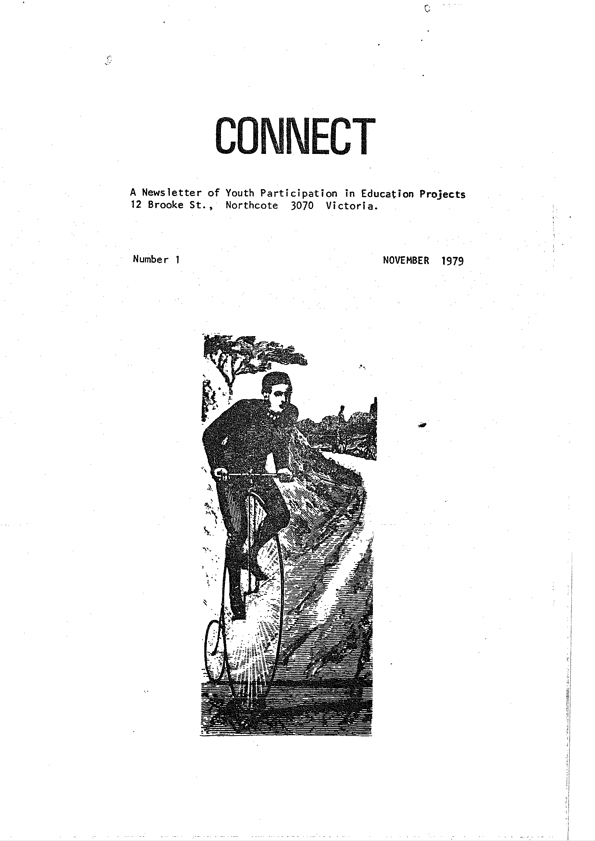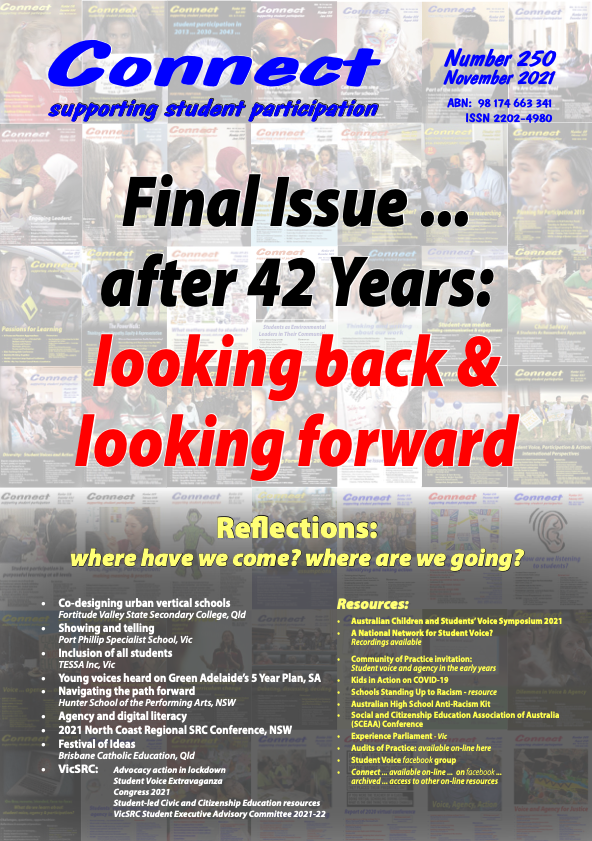The Disturbing Sound of Silence
This article was first published in ReConnectEd.
By Roger Holdsworth
Maybe it’s just me… Maybe I’m just out of the loop now …
But … are things rather quiet out there?
Let me expand on what I mean, and what concerns me.
In November 2021 I published the final issue of a practice journal called Connect that I’d been editing and disseminating bi-monthly for 42 years: 250 issues. I started it as a classroom teacher in Melbourne in late 1979, to share information about approaches in which I’d been involved and about which I was being asked for advice: a cross-age tutoring program, a school-based student-run multi-lingual community newspaper, the development of a small ‘democratic’ community school and so on.
It grew from there, with increasing more and more people contributing their stories, including about students’ participation in school governance, and writing about what they’d learnt from their practices. Other teachers contributed; students wrote about their passions and practices; organisations shared their initiatives around students on committees and boards – and about their support for participatory classrooms. It was initially only a print publication, then was available both in print and on-line, and eventually became solely an electronic publication. All back issues are still available, still useful (I hope) both to describe the trajectory of change (in an area that was initially called ‘youth participation in education’, then ‘student participation’ and eventually adding in ‘student voice and ‘student agency’), and also to communicate abiding great ideas and practices: https://research.acer.edu.au/connect/
The journal had three major intentions: it was dedicated to supporting people (students, teachers, consultants, school leadership, policy makers and others) to:
reflect on practices about student voice, agency and participation in primary and secondary schools, classrooms and systems;
systematically document these practices, and
share these stories with others.
Along the way, it also reviewed, developed and shared resources to help in that work.
It seemed right to stop ‘neatly’ at that point in 2021, to see if the need still existed and, if so, to encourage the ‘next generation’ to look at ways in which such ends could be met. From describing myself for many years as a ‘failed retiree’, it seemed about time to finally succeed at something.
However, looking back over the last subsequent (almost) 18 months, I’m struck by the silences in these areas. Though again, let me reiterate, it may be me, being now out of the loop. There might be a lot happening out there. But I haven’t heard about it,, even though I’m still interested. Iif I haven’t heard about it, I suspect others may not have heard either.
And I worry that there’s more ‘evidence’ of the silence:
While a facebook page called Student Voice Research and Practice(https://www.facebook.com/groups/studentvoicepage) still exists, there’s not been a lot shared there for a while, and what has been, has been about system level advocacy or training or research, not about school or classroom level practice;
The International Journal for Student Voice (IJSV) (https://ijsv.psu.edu/) has not been published for a while, though Dana Mitra advises me that an issue is coming in a few months;
Planned Student Voice conferences (on-line or face to face) in Australia and the USA didn’t go ahead in 2022.
However there has been a recent on-line Symposium in Australia this year, organised by the Australian Council for Student Voice (ACSV)(https://www.studentvoice.org.au/ ); and again I’m advised that the good people in Vermont’s UP for Learning (https://www.upforlearning.org/ )have taken on the initiative for a US-based international event later this year.
Does this silence matter? Perhaps there’s just a ‘natural cycle’ in such activities, with the previous strong activity of the last couple of decades in particular currently ebbing. I remember a similar phase here in Australia in the late 1980s following a strong attention to ‘student participation’ earlier in that decade; check Peter Mildenhall’s article ‘Wither/Whither on the Vine’ in Connect 53 in October 1988 (https://research.acer.edu.au/connect/vol1988/iss53/)
It may be that other imperatives have emerged for schools and system: perhaps the educational responses to COVID have had a role. Perhaps schools have been so busy maintaining some form of ‘teaching and learning’ following COVID learning, initially online and then blended and then returning to classrooms, that the momentum previously established through face-to-face classroom and networks may have dissipated. Perhaps the strength of practices relied upon the commitment to ‘informal student voice’ in the relationships between students and teachers that underpin the formal aspects, and this became challenged during this time of distancing. Perhaps the totally understandable responses to providing support around student mental health and wellbeing became a priority that swept aside the focus on student-teacher classroom, school and system partnerships. Good questions and wonderings … and questions that would be valuable to explore in partnerships between the experts: the students, the teachers, the parents, the educational leaders, the communities, the researchers and others.
But I continue to argue that the underlying approaches that have driven us for at least 50 years, and that resulted in the intentions of Connect, remain important, and that we need to make a conscious and concerted effort to maintain these. Reflections, documentation and sharing remain vital if we’re to challenge the silence.
So here are a few impertinent comments about what I think I learnt, in working with you as an editor and sharer of your stories:
Reflection
Reflection is at the core of strengthening and improving – and even maintaining – your own practices. The first step is thinking about what you’ve been doing – and maybe still are doing. What is actually happening? How do we know? Do different people see what’s happening differently?
In reflecting on an initiative, so we can improve its operation and outcomes, it is valuable that we're able to collect different perspectives: how do students experience what is happening? How about different groups of students, especially those most often excluded from participation and success? How do teachers, parents, school leadership experience it?
Some questions could be asked formally: what actually occurred? (Was it different from what was intended? Why?) Who was involved? How? Who wasn’t? Why? What were the outcomes? How do we know? What were intended outcomes and what were unintended? What do we learn from the experience? If we did it again, what would we do differently?
Write down all this information, these views and perspectives, results of surveys and focus groups and discussions – haphazardly if necessary. Then look through the information, perhaps with a diverse group of participants and others. What patterns do you notice?
What does it tell us for our own development? What’s the next step?
Systematic Documentation
The next step is to organise those reflections into a story. I remember that the late Professor Art Pearl often said: “If it hasn’t been written about, it hasn’t happened.” The story ‘captures’ the events – for you, and eventually for others. Memory alone is fallible and foolable. The development of the story starts in the process of making sense of reflections, both for yourselves, but also in preparation for sharing with others. I like to start with sub-headings to organise the account.
What came first? Why did you start this initiative? Why there; why then? What were you responding to?
Describe, as ‘objectively’ as you can, what happened: what you did, and what you encountered. Did it go smoothly, or as you expected? What emerged as facilitators or barriers? How did you respond?
And then collect together any evidence/data about outcomes: comments from participants, formalised evaluations and so on.
And finally, what advice would you have for your younger self, or for others considering something similar? What’s the next phase of the story for you?
Sharing
Once you have that all together, I’d strongly encourage you to share your story and what you learned. Others may be faced by similar challenges or be interested in similar approaches; your experience will be invaluable. In fact, I remain convinced that hearing/reading/learning about real practices in sufficient detail to try something similar, is the most likely way that broader change occurs.
Have a think about how your story communicates to others. What have you assumed about your situation and circumstances? What is unique, and what perhaps more common? How can you present the different voices and perspectives? (I’ve sometimes suggested a layout of ‘boxes’ on the page to make it look interesting and to highlight the contributions from different groups and people.)
Convey your critical learnings. One of the most frustrating aspects of editing such stories for Connect over the years, was having to ask contributors to be critical, not just boastful. I can understand the pressures on schools, in a climate of explicit or implicit competition between schools, to paint practices in positive lights, despite any hurdles encountered or mis-steps made. But we learn less from the rose-coloured glasses, than from a sharing of the exploration of dead-ends and difficulties – and how these were overcome.
In sharing your story, think also about audience: who do you want to read your story? Who do you want to influence? Your language, including assumptions about jargon – can either lock readers out from understanding your story, or speak clearly to them across borders, jurisdictions and systems. Don’t assume; explain in simple language.
And finally, as an editor, I was constantly asking contributors to provide or suggest images to accompany words. They make the writing clearer, and ground the story in its reality.
Wither/Whither again?
This new old practice journal ReConnectEd is exciting, and bold – and important. I hope its success challenges my initial pessimism about the silence. I hope it keeps me in the loop.
Is there still interest to reflect on, write about, share and read about, practical stories around initiatives in the area of student voice, agency and participation? I want to believe there is a thirst for such ideas; and to read about them in order to develop our own practices. It just needs the commitment to do something about that documentation and sharing. And that commitment needs to come from practitioners: students, teachers, leadership, consultants, parents, administrators, support groups … not just from the editorial group. It might have to happen in new ways, but maintain the old excitement in practice.
Roger Holdsworth
Roger is a retired educator, policy worker, academic and Connect Magazine editor
Contact
r.holdsworth@unimelb.edu.au



